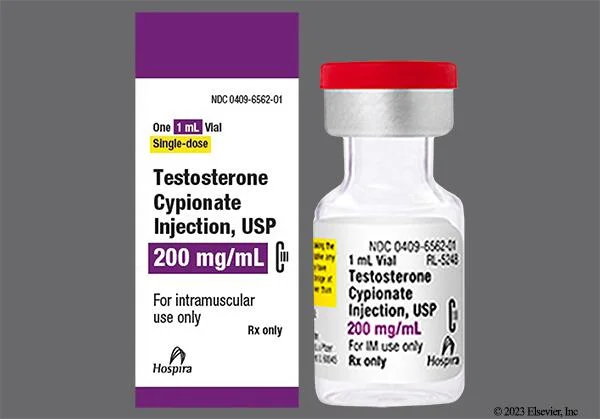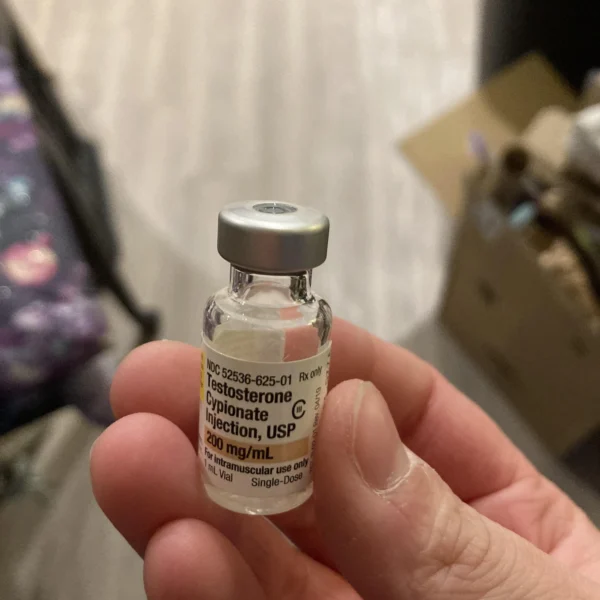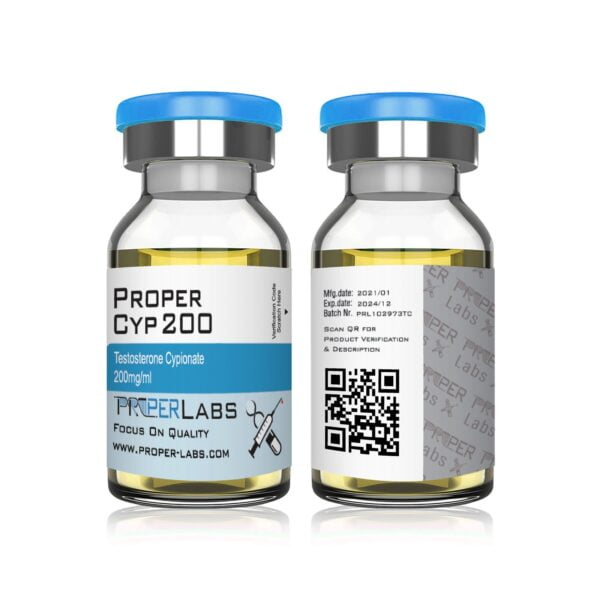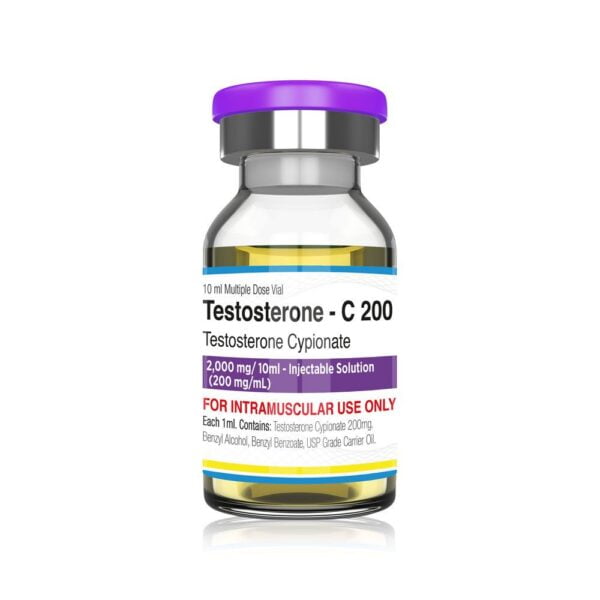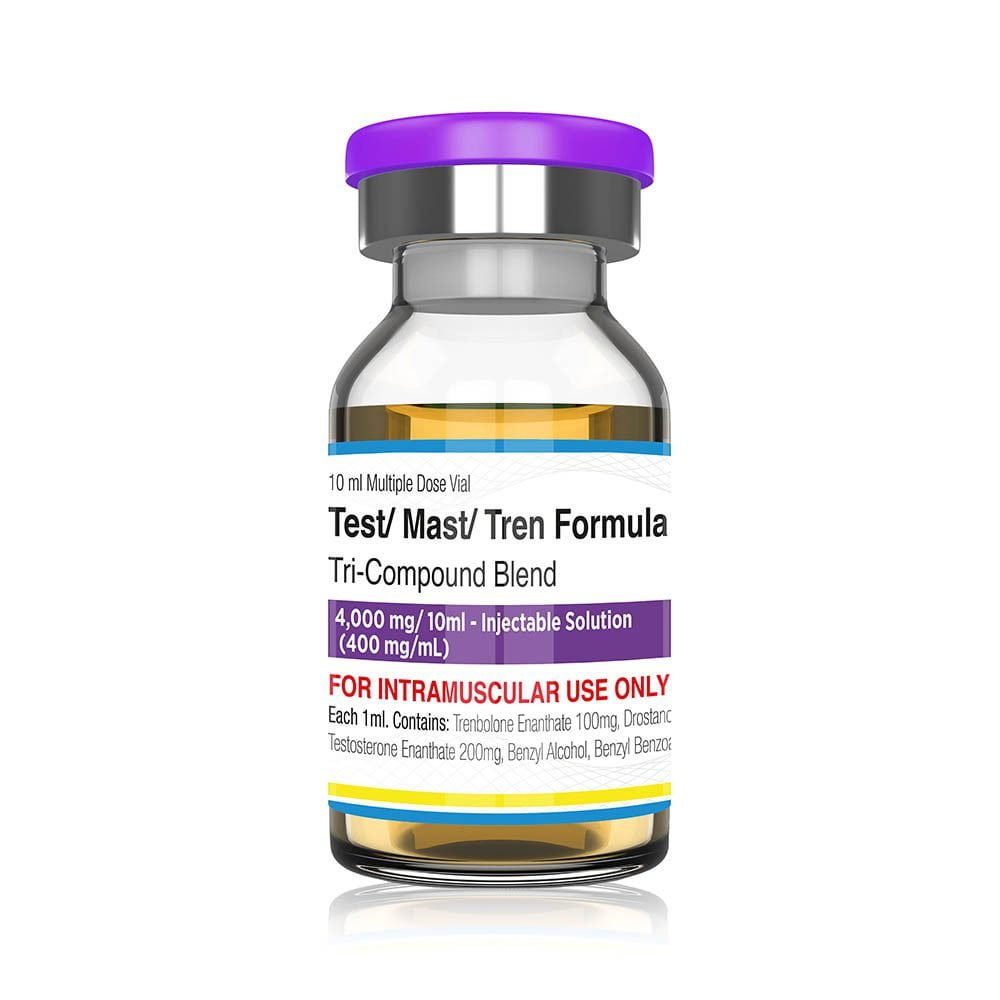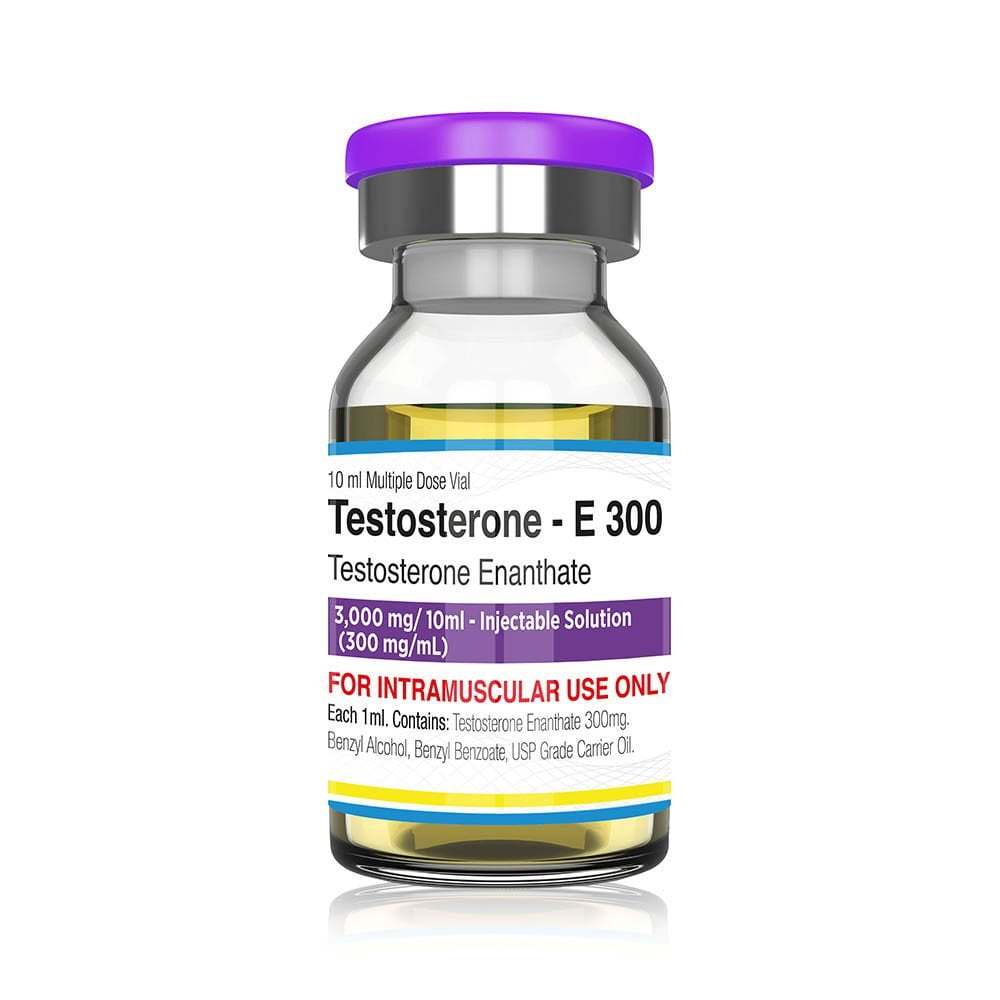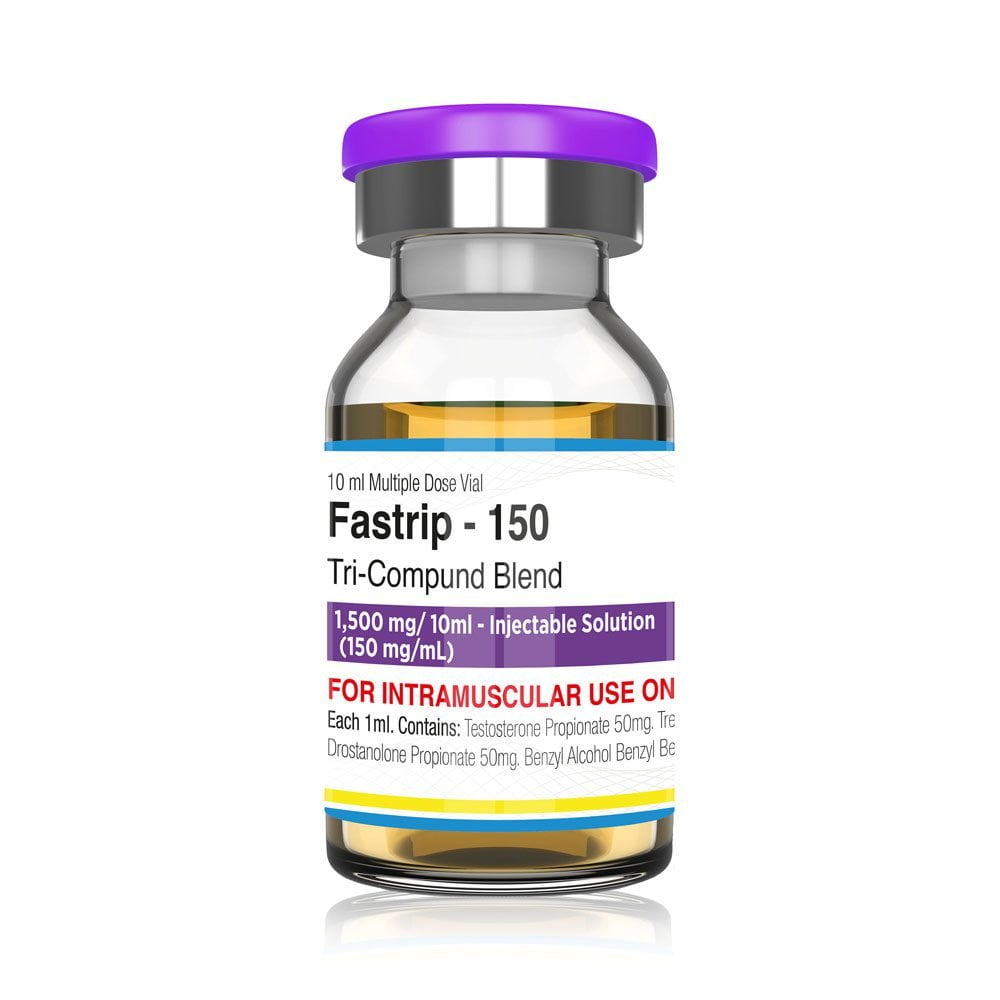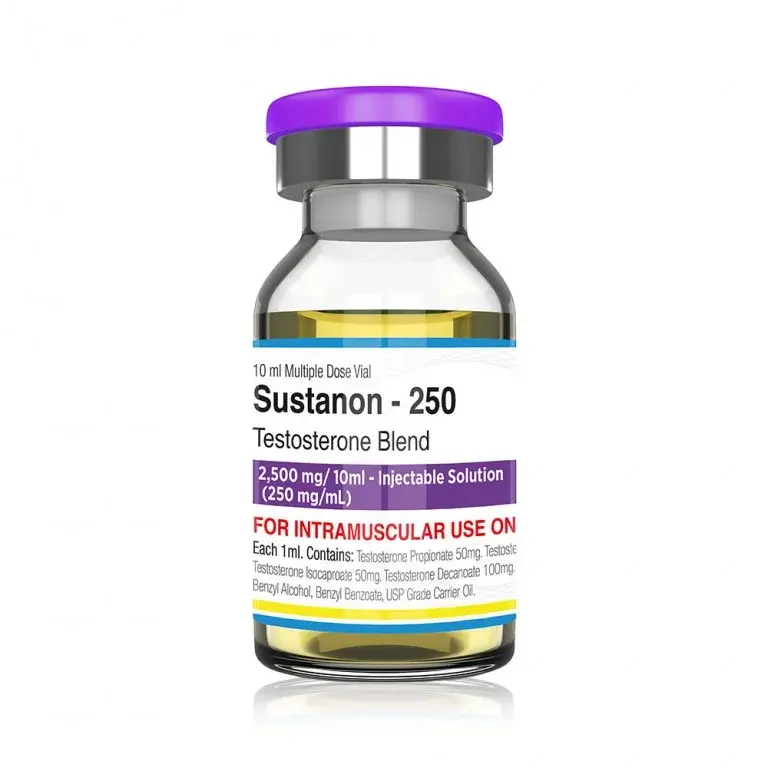Testosterone Cypionate (Depo-Testosterone)
Bodybuilding Guide
Testosterone Cypionate is an injectable, synthetic form of the testosterone hormone. It is primarily used to treat low testosterone levels in men (a condition called hypogonadism) and support normal male development and functions. This medication provides a steady release of testosterone into the body to address deficiencies. Testosterone Cypionate also know as Depo-Testosterone is also commonly used off-label by bodybuilders and athletes to increase muscle mass and strength.
Testosterone Cypionate is the oil-soluble 17β-cyclopentylpropionate ester of the naturally occurring androgen hormone testosterone. As an ester of testosterone, it is more slowly metabolized, staying in the body longer than unmodified testosterone.
Testosterone Cypionate is a prescription medication meant for treating low testosterone levels under a doctor's care. Using it for bodybuilding or enhanced athletic performance without proper medical supervision can be unsafe and illegal. Obtaining or self-administering this synthetic hormone improperly risks serious side effects like liver damage, heart issues, fertility problems, and hormonal imbalances that require medical monitoring to avoid.
How Testosterone Cypionate works?
What is Testosterone Cypionate?
Testosterone Cypionate is a synthetic version of the naturally occurring testosterone hormone. It's primarily used to treat low testosterone levels in men, a condition known as hypogonadism. This medication is an injectable form of testosterone and is one of the most common forms prescribed by doctors.
How Does Testosterone Cypionate Work?
Testosterone Cypionate works by mimicking the effects of natural testosterone in the body. Once injected, it is slowly released into the bloodstream, where it helps maintain stable testosterone levels over time. This hormone plays a crucial role in various bodily functions, including muscle growth, bone density, and the production of red blood cells.
Why is Testosterone Cypionate Used in Bodybuilding?
Bodybuilders often use Testosterone Cypionate to enhance muscle mass, strength, and overall performance. Here are a few reasons why it's popular in the bodybuilding community:
- Muscle Growth: Testosterone is a key hormone for muscle development. It promotes protein synthesis, which is essential for muscle repair and growth after intense workouts.
- Increased Strength: Higher testosterone levels can lead to significant gains in strength, allowing bodybuilders to lift heavier weights and perform more intense training sessions.
- Improved Recovery: Testosterone Cypionate helps reduce muscle fatigue and speeds up recovery times, enabling bodybuilders to train more frequently and effectively.
- Fat Loss: This hormone can also aid in fat loss by increasing the metabolic rate, which helps bodybuilders achieve a leaner, more defined physique.
How Does Testosterone Cypionate Work for Bodybuilding Purposes?
When used for bodybuilding, Testosterone Cypionate is typically administered in cycles. A cycle refers to the period during which the steroid is used, followed by a break to allow the body to recover. Here's how it works:
- Injection: Testosterone Cypionate is usually injected into the muscle, where it is absorbed slowly into the bloodstream.
- Hormone Levels: The injected testosterone helps maintain elevated hormone levels, which supports muscle growth and strength gains.
- Training: With higher testosterone levels, bodybuilders can train harder and recover faster, leading to more significant muscle gains.
- Post-Cycle Therapy (PCT): After completing a cycle, bodybuilders often undergo PCT to help restore natural testosterone production and maintain the gains achieved during the cycle.
Testosterone Cypionate Benefits & Features
Benefits:
- Increased Muscle Mass - The added testosterone promotes greater protein synthesis, nitrogen retention, and muscle growth
- Strength Gains - More testosterone can lead to significant strength increases on major lifts like bench press, squats, deadlifts
- Faster Recovery - Helps muscles recover faster between intense training sessions by reducing muscle damage and fatigue
- Fat Loss - Testosterone can boost metabolic rate and reduce fat mass while preserving lean muscle
- Improved Stamina - Higher red blood cell production provides better muscular endurance
- Libido Boost - Increased testosterone levels can enhance sexual desire and performance
Enhanced Nutrient Partitioning - Higher testosterone levels can increase the body's ability to shuttle more nutrients towards building lean muscle instead of being stored as fat. This aids in achieving a leaner, more muscular physique.
Psychological Benefits - The confidence boost from looking and feeling more muscular, along with testosterone's effects on motivation and aggression, can translate to more intense training focus and drive in the gym.
Features:
- Steady Testosterone Release - The cypionate ester slowly releases testosterone into the bloodstream over 1-2 weeks
- Consistent Levels - Avoids rollercoaster spikes and drops in testosterone common with other esters
- Infrequent Injections - Only needs to be injected every 1-2 weeks to maintain stable levels
- Well-Researched - One of the most studied and oldest testosterone esters available
- Multi-Use - Can be used for TRT, bodybuilding, or other medical purposes when prescribed
Versatile Compound - Testosterone Cypionate is one of the most versatile anabolic steroids. It can be effectively used for bulking to add muscle mass, cutting to burn fat, or maintaining muscle during a caloric deficit.
Cost Effective - Compared to other testosterone compounds, Cypionate is generally less expensive per dose while providing similar anabolic and androgenic benefits when properly administered.
Testosterone Cypionate Dosage
When it comes to dosages of Testosterone Cypionate for bodybuilding or testosterone replacement therapy (TRT), it's very important to follow proper medical guidance as misuse can lead to severe side effects. For the best Test C Dosage contact Your medicial care provider or seek for expert bodybuilding professional advice. Contact us for professional bodybuilding advice. Here's a general overview of typical dosage ranges.
For Women: Testosterone is rarely prescribed for women due to virilizing effects like body hair growth, voice deepening and other masculinizing changes. Overall Testosterone Cypionate usage by women in terms of Bodybuilding is not recommended.
Bodybuilding Dosages: Beginner Level (First 1-2 Cycles):
- 200-300mg per week, split into two doses 7 days apart
- Cycle length of 8-12 weeks
Intermediate Level:
- 400-600mg per week
- Split into two equal doses, injected every 3-4 days
- Cycle length of 12-16 weeks
Advanced/Competition Level:
- 600-1000mg per week for very experienced users only
- Multiple smaller doses spread throughout the week
- Cycle lengths up to 20 weeks
- Requires very careful health/blood monitoring
TRT Dosages:
- Standard starting dose is 100-200mg injected every 7-14 days
- Dosage is adjusted based on follow-up testosterone blood levels
- Target is to raise total testosterone into the normal range (300-1000 ng/dL)
- Lower TRT doses like 100mg every 2 weeks are common
A few important notes:
- Aromatization issues may require an AI (aromatase inhibitor)
- 19-nors like Trenbolone are often stacked for added hardness/fat loss
- Post Cycle Therapy (PCT) is crucial after stopping to restart natural production
Testosterone Cypionate Cycle
It's important to note that these are general recommendations, and individual factors such as age, fitness goals, and overall health should be considered. Additionally, proper medical supervision and guidance from a qualified healthcare professional or experienced bodybuilder are essential when undertaking any anabolic steroid cycle.
If You're looking for special cycle recommendations, made personally for You - contact us! Our experienced team will help You in Your Testosterone Cypionate - Test C Cycle.
Beginner 12 Week Cycle:
| Week | Weekly Dose | Injection Protocol |
|---|---|---|
| 1 | 200mg | 2 x 100mg injections, 7 days apart |
| 2 | 250mg | 2 x 125mg injections, 7 days apart |
| 3-10 | 300mg | 2 x 150mg injections, 7 days apart |
| 11-12 | 300mg | 2 x 150mg injections, 7 days apart |
| 13-14 | - | Start PCT 2 weeks after final injection |
Intermediate 16 Week Cycle:
| Week | Weekly Dose | Injection Protocol |
|---|---|---|
| 1-4 | 500mg | 2 x 250mg injections, 3.5 days apart |
| 5-12 | 600mg | 2 x 300mg injections, 3.5 days apart |
| 13-16 | 600mg | 2 x 300mg injections, 3.5 days apart |
| 17-18 | - | Start PCT 2 weeks after final injection |
Advanced 20 Week Cycle:
| Week | Weekly Dose | Injection Protocol |
|---|---|---|
| 1-4 | 600mg | 3 x 200mg injections |
| 5-8 | 700mg | 2 x 350mg injections |
| 9-16 | 800mg | Multiple smaller injections for stable levels |
| 17-20 | 1000mg | Daily or EOD injections |
| 21-22 | - | Start PCT 2 weeks after final injection |
TRT Dosing:
| Dose | Injection Frequency | Notes |
|---|---|---|
| 200mg | Every 14 days | Start here, get bloods after 6-8 weeks |
| 100-200mg | Every 7-14 days | Adjust dose/frequency to keep test levels normal |
Testosterone Cypionate Side Effects
Like any medication, Testosterone Cypionate can potentially cause side effects in some users. Understanding the risks and how to manage them is important for a safe, successful cycle.
Most Common Side Effects:
- Acne/Oily Skin: This is indeed a common side effect due to increased sebum production.
- Hair Loss: Testosterone can accelerate male pattern baldness in genetically predisposed individuals.
- Mood Changes: Fluctuations in testosterone levels can affect mood, but the extent and nature of changes can vary.
- Injection Site Pain/Swelling: This is a common and expected side effect of intramuscular injections.
- High Blood Pressure: Testosterone can potentially increase blood pressure in some individuals.
- Natural Testosterone Shutdown: Extended use of exogenous testosterone can suppress natural production.
Less Common Side Effects:
- Gynecomastia: This can occur due to the conversion of excess testosterone to estrogen.
- Testicular Atrophy: This is a known effect of prolonged exogenous testosterone use.
- Insomnia: While testosterone can affect sleep, the direct link to insomnia is less established.
- Polycythemia: Increased red blood cell production is a known effect of testosterone therapy.
- Liver Strain: Injectable testosterone typically has minimal direct liver effects, unlike oral forms.
- Prostate Enlargement: Testosterone can potentially affect prostate size, particularly in older men.
Tips & Preventative Measures:
- Use an Aromatase Inhibitor (AI) like Arimidex to control estrogen conversion/buildup and prevent gyno
- Take a DHT blocker like finasteride or saw palmetto to prevent hair loss, prostate issues
- Implement periodic blood pressure monitoring and adjust dosage if elevated BP occurs
- Supplement with liver support compounds like UDCA or NAC to ease hepatic strain
- Stay well hydrated and get enough dietary fats to assist injected oil dispersion
- Consider breaking up dosage into smaller, more frequent injections for better stability
- Always practice proper injection technique/sterile procedures to avoid infections
Helpful Supplements:
- Zinc + Vitamin B6 - Helps block prolactin that can cause puffy nipple issues
- Saw Palmetto - Natural DHT blocker that supports prostate health
- DIM (Diindolylmethane) - Regulates estrogen metabolites, enhances "good" estrogens
- NAC (N-Acetyl Cysteine) - Powerful antioxidant that supports liver function
- UDCA (Ursodeoxycholic Acid) - Bile salt that improves cholesterol and eases liver stress
- Hawthorn Berry - Helps regulate blood pressure by relaxing vessel tension
- Tribulus - May help restart natural testosterone production during PCT
What to know:
- Try injecting daily or every other day for tighter hormone control and stability
- Implement intermittent low-dose HCG throughout to prevent testicular desensitization
- Switch to fast-acting Test Propionate temporarily if sides become too harsh on Cypionate
- Use topical anti-acne treatments alongside internal supplements for managing breakouts
- Get frequent bloodwork to monitor health markers and dial in AI/supplement dosing
- Ensure proper on-cycle and post-cycle therapy (PCT) protocols are dialed in
Testosterone Cypionate Stacks
Testosterone Cypionate is a versatile steroid that can be stacked with other compounds to achieve different bodybuilding goals. The right combination can accelerate muscle growth, fat loss or improve performance. Here are some popular stack options:
For Bulking/Muscle Gain:
Beginner - Test C 400-600mg + Deca 300-400mg (12-16 weeks) The classic "deca-test" bulk provides slow, high-quality muscle accrual.
Intermediate - Test C 500-800mg + Deca 400mg + Dianabol 25-50mg (16-20 weeks) Dianabol kickstarts rapid muscle and strength gains early in the cycle.
Advanced - Test C 750-1000mg + Tren A 350-500mg + Anadrol 50-100mg (8-12 weeks) Highly androgenic and potent for maximum tissue growth, but liver/side effect management is crucial.
For Cutting/Fat Loss:
Beginner - Test C 300mg + Anavar 40-60mg (8-12 weeks) Anavar preserves muscle while enhancing fat loss and vascularity.
Intermediate - Test C 400-600mg + Winstrol 25-50mg + Masteron 300-400mg (10-14 weeks) Winstrol and Masteron together provide great hardening and drying effects.
Advanced - Test C 600-800mg + Tren A 350-500mg + Anavar 60-80mg (6-10 weeks) Trenbolone powerfully enhances nutrient partitioning for shredded conditioning.
For Performance (Advanced Bodybuilders only):
Test C 400-600mg + EQ 600-800mg + Anadrol 50mg (12-16 weeks) EQ increases RBC and aerobic capacity while Anadrol boosts strength early.
Test C 200-300mg + Deca 200-300mg + Dianabol 20-30mg (8-12 weeks) Dianabol kickstarts fast strength gains ideal for powerlifting cycles.
A few unique tips:
- Frontload orals like Dbol the first 4-6 weeks of Test C cycle
- Injectable Superdrol can be potent for short burst at end of bulk cycles
- HGH can be stacked anytime to enhance fat loss and recovery
- Clenbuterol provides extra conditioning as a non-steroidal addition
The key is matching testosterone dose and compounds to your experience level, goals and management of side effects. Blood work and careful planning are essential for safe, successful stacks.
Bulking/Muscle Gain Stacks
Beginners / Semi-Advanced Bodybuilders / Professional Bodybuilders
12 Week Beginner Cycle:
| Week | Test C | Deca |
|---|---|---|
| 1 | 200mg | 300mg |
| 2 | 200mg | 300mg |
| 3 | 200mg | 300mg |
| 4 | 200mg | 300mg |
| 5 | 400mg | 300mg |
| 6 | 400mg | 300mg |
| 7 | 400mg | 300mg |
| 8 | 400mg | 300mg |
| 9 | 350mg | 300mg |
| 10 | 350mg | 300mg |
| 11 | 200mg | 300mg |
| 12 | 200mg | 300mg |
Start PCT 2 weeks after last injection.
16 Week Semi-Advanced Bodybuilder Cycle:
| Week | Test C | Deca | Dianabol |
|---|---|---|---|
| 1 | 200mg | 400mg | 25mg/day |
| 2 | 200mg | 400mg | 25mg/day |
| 3 | 350mg | 400mg | 25mg/day |
| 4 | 350mg | 400mg | 25mg/day |
| 5 | 500mg | 400mg | - |
| 6 | 500mg | 400mg | - |
| 7 | 500mg | 400mg | - |
| 8 | 500mg | 400mg | - |
| 9 | 500mg | 400mg | - |
| 10 | 500mg | 400mg | - |
| 11 | 500mg | 400mg | - |
| 12 | 500mg | 400mg | - |
| 13 | 350mg | 400mg | - |
| 14 | 350mg | 400mg | - |
| 15 | 200mg | 400mg | - |
| 16 | 200mg | 400mg | - |
Start PCT 2 weeks after last injection
8 Week Advanced-Professional Bodybuilder Cycle:
| Week | Test C | Tren A | Anadrol |
|---|---|---|---|
| 1 | 450mg | 350mg | 50mg/day |
| 2 | 450mg | 350mg | 50mg/day |
| 3 | 550mg | 350mg | 50mg/day |
| 4 | 550mg | 350mg | 50mg/day |
| 5 | 750mg | 350mg | 50mg/day |
| 6 | 750mg | 350mg | 50mg/day |
| 7 | 350mg | 350mg | 50mg/day |
| 8 | 350mg | 350mg | 50mg/day |
Start PCT 2 weeks after last injection
Cutting / Fat Loss Stacks
Beginners / Semi-Advanced Bodybuilders / Professional Bodybuilders
Beginner Bodybuilder Cutting Stack:
| Week | Test C | Anavar |
|---|---|---|
| 1 | 300mg | 20mg/day |
| 2 | 300mg | 30mg/day |
| 3 | 300mg | 40mg/day |
| 4 | 300mg | 50mg/day |
| 5 | 300mg | 50mg/day |
| 6 | 300mg | 50mg/day |
| 7 | 300mg | 50mg/day |
| 8 | 300mg | 50mg/day |
| 9 | 300mg | 50mg/day |
| 10 | 300mg | 40mg/day |
| 11 | 300mg | 30mg/day |
| 12 | 300mg | 20mg/day |
| 14 | Start PCT |
Intermediate/Semi-Advanced Bodybuilder Cutting Stack:
| Week | Test C | Winstrol | Masteron |
|---|---|---|---|
| 1 | 200mg | 50mg/day | 200mg |
| 2 | 200mg | 50mg/day | 200mg |
| 3 | 350mg | 50mg/day | 300mg |
| 4 | 350mg | 50mg/day | 300mg |
| 5 | 400mg | 50mg/day | 350mg |
| 6 | 400mg | 50mg/day | 350mg |
| 7 | 600mg | 50mg/day | 400mg |
| 8 | 600mg | 50mg/day | 400mg |
| 9 | 600mg | 50mg/day | 400mg |
| 10 | 600mg | 50mg/day | 400mg |
| 11 | 350mg | 50mg/day | 300mg |
| 12 | 350mg | 50mg/day | 300mg |
| 13 | 200mg | 50mg/day | 200mg |
| 14 | 200mg | 50mg/day | 200mg |
| 16 | Start PCT |
Advanced/Expert Bodybuilder Cutting Stack:
| Week | Test C | Tren A | Anavar |
|---|---|---|---|
| 1 | 400mg | 400mg | 30mg/day |
| 2 | 400mg | 400mg | 30mg/day |
| 3 | 500mg | 400mg | 40mg/day |
| 4 | 500mg | 400mg | 40mg/day |
| 5 | 800mg | 400mg | 50mg/day |
| 6 | 800mg | 400mg | 50mg/day |
| 7 | 800mg | 400mg | 60mg/day |
| 8 | 800mg | 400mg | 60mg/day |
| 9 | 600mg | 400mg | 80mg/day |
| 10 | 600mg | 400mg | 80mg/day |
| 12 | Start PCT |
Performance Cycle:
Test C 400-600mg + EQ 600-800mg + Anadrol 50mg (12-16 weeks) for Advanced/Professional Bodybuilders
| Week | Test C (mg) | EQ (mg) | Anadrol (mg) |
|---|---|---|---|
| 1 | 300 | 600 | 50 |
| 2 | 300 | 600 | 50 |
| 3 | 400 | 600 | 50 |
| 4 | 400 | 600 | 50 |
| 5 | 500 | 700 | 50 |
| 6 | 500 | 700 | 50 |
| 7 | 500 | 700 | 50 |
| 8 | 500 | 800 | 50 |
| 9 | 500 | 800 | 50 |
| 10 | 500 | 800 | 50 |
| 11 | 500 | 800 | 50 |
| 12 | 400 | 700 | 50 |
| 13 | 400 | 700 | 50 |
| 14 | 300 | 700 | 50 |
| 15 | 300 | 600 | 50 |
| 16 | 300 | 600 | 50 |
Start PCT 2 weeks after last injection.
Testosterone Cypionate PCT
Post Cycle Therapy (PCT) is a crucial phase for anyone who has completed a cycle of Testosterone Cypionate. PCT helps restore the body's natural hormone levels, reduce potential side effects, and maintain the gains achieved during the cycle. Without proper PCT, users risk prolonged suppression of natural testosterone production, which can lead to various health issues.
When to Start PCT
The timing of PCT is essential for its effectiveness. For Testosterone Cypionate, which has a longer half-life, it is generally recommended to start PCT approximately 2-3 weeks after your last injection. This allows the synthetic testosterone to clear your system adequately, ensuring that PCT can effectively stimulate natural testosterone production.
What to Take for PCT
A successful PCT regimen often includes the following medications:
Selective Estrogen Receptor Modulators (SERMs):
- Nolvadex (Tamoxifen): Commonly used to block estrogen receptors, Nolvadex helps prevent estrogen-related side effects and stimulates natural testosterone production.
- Clomid (Clomiphene): Another popular SERM, Clomid works similarly to Nolvadex by blocking estrogen receptors and promoting the release of hormones that stimulate testosterone production.
Aromatase Inhibitors (AIs):
- Arimidex (Anastrozole): AIs are used to prevent the conversion of testosterone to estrogen, reducing the risk of estrogen-related side effects such as gynecomastia (development of breast tissue in men).
For a Testosterone Cypionate cycle, it's generally recommended to start HCG during the last weeks of the cycle or immediately after the cycle ends, but before starting SERMs. This timing helps ensure that the testes are responsive and producing testosterone when you begin the SERM phase of PCT.
Week 1-2: (without HCG)
- Nolvadex: 40mg per day
- Clomid: 50mg per day
Week 3-4: (without HCG)
- Nolvadex: 20mg per day
- Clomid: 25mg per day
HCG Phase:
- Weeks 1-3: HCG 500-1000 IU EOD
SERM Phase (following HCG):
- Week 4-5: Nolvadex (Tamoxifen) 40mg per day and Clomid (Clomiphene) 50mg per day
- Week 6-7: Nolvadex 20mg per day and Clomid 25mg per day
Tips for a Successful PCT
- Stay Consistent: Adhere strictly to your PCT schedule to ensure the best results.
- Monitor Your Health: Regularly check your hormone levels through blood tests to track your recovery progress.
- Maintain a Healthy Diet: Eat a balanced diet rich in vitamins and minerals to support your body's recovery.
- Maintain a Healthy Diet: Eat a balanced diet rich in vitamins and minerals to support your body's recovery. Foods high in zinc, vitamin D, and healthy fats can be particularly beneficial for testosterone production.
- Stay Hydrated: Proper hydration is crucial for overall health and can aid in the detoxification process.
- Exercise Wisely: While it's important to stay active, avoid overtraining. Focus on moderate exercises that promote overall well-being without putting excessive stress on your body.
- Get Enough Sleep: Quality sleep is essential for hormone regulation and overall recovery. Aim for 7-9 hours of sleep per night.
- Avoid Alcohol and Recreational Drugs: These substances can negatively impact your hormone levels and hinder your recovery process.
Unique Knowledge about PCT
- Herbal Supplements: Some users incorporate herbal supplements like Tribulus Terrestris, Fenugreek, and Ashwagandha to support natural testosterone production. While the scientific evidence is mixed, some find these supplements beneficial.
- Mental Health: Hormonal fluctuations can impact your mood and mental health. Be mindful of any changes in your emotional state and seek support if needed. Practices like meditation, yoga, and mindfulness can help manage stress and promote mental well-being.
- Long-Term Health: PCT is not just about short-term recovery. It's an opportunity to establish long-term healthy habits that can benefit your overall health and hormone balance.
- Individual Variability: Everyone's body responds differently to PCT. What works for one person might not work for another. It's important to tailor your PCT plan to your specific needs and consult with a healthcare professional if possible. For personal expert advice on PCT - Contact us.
Testosterone Cypionate Legal-Status
Testosterone Cypionate is a popular anabolic steroid used for medical and performance-enhancing purposes. However, its legal status varies across different countries. Knowing the legal implications can help users avoid legal troubles and ensure they are using the medication responsibly.
Legal Status in the USA
In the United States, Testosterone Cypionate is classified as a Schedule III controlled substance under the Controlled Substances Act. This means:
- Prescription Requirement: It is illegal to possess or use Testosterone Cypionate without a prescription from a licensed healthcare provider. It is typically prescribed for medical conditions such as hypogonadism (low testosterone levels).
- Penalties for Illegal Possession: Possessing or distributing Testosterone Cypionate without a prescription can lead to significant legal consequences, including fines and imprisonment.
- Use in Sports: The use of Testosterone Cypionate for performance enhancement is banned by most sports organizations, including the World Anti-Doping Agency (WADA) and the United States Anti-Doping Agency (USADA).
Legal Status in Canada
In Canada, Testosterone Cypionate is also regulated but falls under a different classification:
- Prescription Requirement: Similar to the USA, Testosterone Cypionate is available only by prescription. It is prescribed for medical conditions related to low testosterone levels.
- Controlled Drug: It is listed under Schedule IV of the Controlled Drugs and Substances Act. Unauthorized possession or distribution can result in legal penalties, although these are generally less severe than in the USA.
- Sports Regulations: The use of Testosterone Cypionate for performance enhancement is prohibited by Canadian sports organizations and international bodies like WADA.
Legal Status Worldwide
The legal status of Testosterone Cypionate varies significantly around the world:
- Europe: In many European countries, Testosterone Cypionate is available by prescription only. Regulations are strict, and unauthorized use or distribution can lead to legal action.
- Australia: Testosterone Cypionate is classified as a Schedule 4 substance, meaning it requires a prescription. Possession without a prescription can result in legal penalties.
- Asia: Regulations vary widely. In some countries, it is available only by prescription, while in others, it may be more readily accessible. However, using it without medical supervision is generally discouraged.
- Latin America: Access to Testosterone Cypionate can be less regulated in some Latin American countries. While it may be easier to obtain without a prescription, using it without medical supervision is still risky and can lead to health complications.
- Middle East: Regulations vary widely. In some countries, Testosterone Cypionate is strictly controlled and available only by prescription, while in others, it may be more accessible. Always check local laws before attempting to purchase or use it.
- Africa: The legal status can differ greatly from one country to another. In some regions, it is regulated and requires a prescription, while in others, enforcement may be more lenient.
What You Should Know
- Always Check Local Laws: Before purchasing or using Testosterone Cypionate, it's crucial to understand the local laws and regulations. This can help you avoid legal issues and ensure you are using the medication responsibly.
- Consult a Healthcare Provider: Always consult with a healthcare provider before starting any new medication, including Testosterone Cypionate. They can provide guidance on proper usage and monitor your health.
- Be Aware of Sports Regulations: If you are an athlete, be aware that most sports organizations ban the use of anabolic steroids, including Testosterone Cypionate. Using it can result in disqualification and other penalties.
- Health Risks: Using Testosterone Cypionate without medical supervision can lead to serious health risks, including hormonal imbalances, liver damage, and cardiovascular issues. Always use it as directed by a healthcare provider.
Testosterone Cypionate in Sport
Paul Pogba case (2023): The Juventus player tested positive for testosterone during a doping control on August 20, 2023. He faces a potential four-year suspension if the B sample confirms the presence of testosterone Read more
Floyd Landis (2006): The US cyclist tested positive for testosterone after winning the 2006 Tour de France
Justin Gatlin (2006-2010): The 100-meter specialist was suspended from 2006 to 2010 for testosterone use
Richard Freeman case (2023): The former doctor of the Sky cycling team was suspended in August 2023 for possession of testosterone
BALCO scandal: This infamous performance-enhancing drugs scandal in U.S. sports history involved Victor Conte's California-based lab, which provided testosterone and other substances to athletes Read more
Widespread use in MMA: Over the past five years, numerous MMA athletes received therapeutic use exemptions (TUEs) for testosterone use, raising concerns about potential doping and unfair advantages in the sport Read more
Vitor Belfort case: At age 33, the MMA fighter was diagnosed with low testosterone and began testosterone replacement therapy, which coincided with a career resurgence
East German doping program: There was an institutionalized system of testosterone doping used by athletes from the former East Germany
Prevalence in U.S. baseball and football: These sports, which remain outside World Anti-Doping Agency (WADA) jurisdiction, have seen rampant androgen abuse Read more
Designer androgens: Since 2002, three designer androgens (norbolethone, tetrahydrogestrinone [THG], and desoxymethyltestosterone [DMT]) were discovered, purpose-manufactured to evade WADA detection
Detection Methods for Testosterone Cypionate
1. Mass Spectrometric Detection
Mass spectrometry is a primary method used for the bioanalysis of steroid hormone derivatives, including Testosterone Cypionate. This technique allows for the identification and characterization of steroids and their metabolites in biological samples.
2. High-Performance Liquid Chromatography (HPLC)
A reverse phase HPLC method with UV detection has been developed and validated for detecting Testosterone Cypionate. This method is used to quantify related impurities and ensure the quality control of the substance. The chromatographic system utilizes a Zorbax XDB-C8 column with gradient elution, and the detection is set at 240 nm.
3. Gas Chromatography-Mass Spectrometry (GC-MS)
GC-MS is another robust method for detecting testosterone and its esters in urine samples. This method can distinguish between pharmaceutical and natural testosterone by analyzing the carbon isotope ratios of urinary steroids.
4. Testosterone/Epitestosterone Ratio
An indirect method to detect testosterone doping involves measuring the testosterone/epitestosterone glucuronide ratio. Elevated ratios can indicate exogenous testosterone administration. The World Anti-Doping Agency (WADA) has set guidelines for reporting abnormal profiles of urinary steroids resulting from testosterone administration.
Detection Time of Testosterone Cypionate
The detection time for Testosterone Cypionate can vary based on several factors, including the dosage, frequency of administration, and individual metabolism. However, general detection windows for testosterone esters are as follows:
- Single Dose: Testosterone Cypionate can be detected in urine for up to several weeks after a single dose.
- Chronic Use: For individuals using Testosterone Cypionate chronically, detection times can extend to several months after the last dose.
Testosterone Cypionate Tips & Guide
Testosterone Cypionate is a medication used to treat low testosterone levels in men. It's important to follow guidelines to ensure safe and effective use. Here’s a comprehensive guide to help you understand how to use it correctly.
How to Inject Testosterone Cypionate
Choose the Right Equipment:
- Syringe and Needle: Use a sterile syringe and needle. Typically, a 22-25 gauge needle is recommended for injecting testosterone.
- Alcohol Swabs: Use these to clean the vial and injection site.
Preparation:
- Wash Your Hands: Ensure your hands are clean to avoid infection.
- Clean the Vial: Wipe the top of the vial with an alcohol swab.
- Draw the Medication: Pull back the plunger to draw air into the syringe equal to your prescribed dose. Insert the needle into the vial, push the air in, then draw the medication out.
Injection Sites:
- Common Sites: The most common injection sites are the gluteus (buttocks) and the thigh.
- Rotate Sites: Rotate injection sites to prevent tissue damage and scarring.
Injecting:
- Clean the Area: Wipe the injection site with an alcohol swab.
- Insert the Needle: Insert the needle at a 90-degree angle to the skin.
- Inject the Medication: Push the plunger slowly to inject the medication.
- Remove the Needle: Withdraw the needle and apply pressure with a clean swab.
Preparing for Injection
- Check the Medication: Ensure the Testosterone Cypionate is not expired and the solution is clear.
- Warm the Vial: If the solution is thick, you can warm the vial in your hands to make it easier to draw.
- Avoid Air Bubbles: Tap the syringe to move air bubbles to the top and push the plunger slightly to remove them.
Tips on Supplements
- Supportive Supplements:
- Vitamin D: Supports overall testosterone levels.
- Zinc: Essential for testosterone production.
- Omega-3 Fatty Acids: Help reduce inflammation and support heart health.
- Protein Intake: Ensure adequate protein intake to support muscle growth and recovery.
How important is Post Cycle Therapy (PCT)
Post Cycle Therapy (PCT) is crucial after completing a cycle of Testosterone Cypionate. PCT helps your body restore its natural testosterone production and maintain the gains achieved during the cycle. Here’s why PCT is important:
- Hormone Balance: PCT helps restore the natural balance of hormones in your body, which can be disrupted during a testosterone cycle.
- Prevent Side Effects: Proper PCT can help prevent side effects such as mood swings, fatigue, and loss of muscle mass.
- Maintain Gains: By supporting your body’s natural testosterone production, PCT helps you maintain the muscle and strength gains achieved during the cycle.
What to know:
- Consistency is Key: Consistent use and proper administration of Testosterone Cypionate are essential for achieving the desired results. Skipping doses or improper injection techniques can hinder progress.
- Monitor Your Health: Regular blood tests can help monitor your testosterone levels and ensure you’re within the optimal range. This can help adjust dosages if necessary and avoid potential health issues.
- Stay Hydrated: Drinking plenty of water is crucial for overall health and can help with the absorption and effectiveness of the medication.
- Lifestyle Matters: A healthy lifestyle, including a balanced diet, regular exercise, and adequate sleep, can enhance the effectiveness of Testosterone Cypionate and support overall well-being.
- Educate Yourself: Understanding the medication, its effects, and how to use it properly can help you make informed decisions and use it safely. Always refer to credible sources and consult healthcare professionals. Remember that our expert team is always ready to help.
Testosterone Cypionate FAQ
Yes, Testosterone Cypionate can help build muscle. It increases protein synthesis, which is crucial for muscle growth. When combined with proper diet and exercise, it can significantly enhance muscle mass and strength.
For bodybuilding purposes, Testosterone Cypionate is typically injected once or twice a week. This helps maintain stable testosterone levels in the blood, which is important for consistent muscle growth and performance.
Bodybuilders may take varying doses of Testosterone Cypionate, often ranging from 200 mg to 600 mg per week. However, these dosages can vary based on individual goals, experience, and tolerance.
The effects of Testosterone Cypionate can be noticed within a few weeks, with significant changes typically occurring after 4-6 weeks. Muscle mass and strength gains, improved energy levels, and enhanced recovery are common benefits observed during this period.
Yes, you can achieve significant muscle gains on Testosterone Replacement Therapy (TRT) if you combine it with a proper diet and exercise regimen. TRT helps restore normal testosterone levels, which can enhance muscle growth, strength, and overall physical performance.
There is no definitive answer regarding the best time to inject Testosterone Cypionate. The choice between morning or night injections depends on personal preference and convenience. Consistency in timing is more important to maintain stable testosterone levels.
The best places to inject Testosterone Cypionate are the gluteus (buttocks) and the thigh. These muscles are large and can absorb the medication well. Rotating injection sites can help prevent tissue damage and scarring.
Taking Testosterone Cypionate weekly is generally preferred for bodybuilding to maintain stable blood levels of testosterone. Biweekly injections can lead to fluctuations in hormone levels, which might affect muscle growth and overall performance.
Testosterone Cypionate typically peaks in the bloodstream about 24 to 48 hours after injection. This peak is followed by a gradual decline over the next several days. This is why weekly injections are often recommended to maintain stable levels.
You can tell if Testosterone Cypionate is working by monitoring several indicators:
- Muscle Growth: Increased muscle mass and strength.
- Energy Levels: Enhanced energy and reduced fatigue.
- Mood: Improved mood and mental clarity.
- Libido: Increased sexual drive and performance.
- Recovery: Faster recovery times after workouts. Regular blood tests can also confirm that your testosterone levels are within the desired range.
Testosterone Cypionate can start to raise testosterone levels within a few days of the first injection. However, noticeable effects on muscle growth, energy, and mood typically become more evident after 2 to 4 weeks of consistent use.
Injecting too much Testosterone Cypionate can lead to several adverse effects, including:
- Hormonal Imbalance: High estrogen levels, leading to gynecomastia (breast tissue growth in men).
- Mood Swings: Increased aggression, anxiety, or depression.
- Cardiovascular Issues: Elevated blood pressure and increased risk of heart disease.
- Liver Damage: Potential liver toxicity.
- Other Side Effects: Acne, hair loss, and testicular atrophy (shrinking of the testicles). Always adhere to the prescribed dosage and consult your healthcare provider if you experience any adverse effects.
The effectiveness of 1ml of Testosterone Cypionate per week depends on the concentration of the solution. For example, if the solution is 200 mg/ml, then 1ml equals 200 mg of testosterone. This dosage can be sufficient for muscle building.
Testosterone Cypionate and Testosterone Enanthate are two of the most commonly used forms for muscle building. Both have similar effects and half-lives, making them effective for increasing muscle mass and strength. The choice between them often comes down to personal preference and availability.
Testosterone can improve erectile function and increase libido, which might make it easier to achieve and maintain erections. However, it’s important to note that erectile dysfunction can have multiple causes, and testosterone therapy may not be effective for everyone.
Testosterone Cypionate Reviews
I’m happier, I have more energy, and I feel like myself. - Webmd.com
increased energy, better sleep, mood mellowed out definitely plateaued towards the next injection day, which sucked - webmd.com
I was mentally and physically weak I had no sex drive and couldn't get an erection at 40 yrs the hair on my body was gone like my self esteem. I've been getting testosterone shots for 6 months and boy am I a new person I have even lost weight with a diet and work out regimen. - webmd.com
For Hypogonadism, Male "Had low testosterone. I was in a car accident and had a head injury. This caused my pituitary gland to stop working and shrank from the pressure in my brain. I didn't want a patch. I inject every 2 weeks and it works great. It's much cheaper, nobody has to know unless you tell them and it takes 5 minutes every 2 weeks. What could be easier." - drugs.com
"I'm on testosterone for gender dysphoria and I've had minimal negative side effects and have found testosterone to reverse some of my depression symptoms."- drugs.com
For Hypogonadism, Male "I had suffered from anxiety and depression (suicidal grade) since I was a boy. I first began taking antidepressants at age 12. My doctor had a chart in her office about low T; it listed 10 symptoms. I had all 10. I asked her to prescribe it. So, she did all of the required tests. I was within the average range. 7 years later, same results, I am now 48. Finally, in January of 2014, I said that I would chance any side effect. My tests had come back normal yet again. But, she did prescribe it. I woke up on day 14 with NO depression or anxiety. What can I say, 48 years of existing and my brain chemistry is now great. My energy level is incredible and depression simply doesn't happen. It is quite a miracle. Get it!" - drugs.com
Testosterone Cypionate Where to buy
Price of Testosterone Cypionate
The cost of Testosterone Cypionate can vary based on several factors, including the dosage, brand, and where you purchase it. Here’s a general idea of what you might expect to pay:
- Dosage and Quantity: Testosterone Cypionate is typically available in 100 mg/ml or 200 mg/ml concentrations. A common prescription might be a 10 ml vial. Prices can range from $50 to $150 per vial, depending on the concentration and quantity.
- Brand vs. Generic: Brand-name versions like Depo-Testosterone can be more expensive than generic versions. Generic options can save you money without compromising on quality.
- Insurance Coverage: Some insurance plans may cover part or all of the cost of Testosterone Cypionate if it's prescribed for medical reasons. Check with your insurance provider to understand your coverage.
Where to Buy Testosterone Cypionate in the USA
- Local Pharmacies: Major pharmacy chains like CVS, Walgreens, and Rite Aid stock Testosterone Cypionate. You can usually get it with a prescription from your doctor. Prices may vary, so it’s worth calling ahead to check.
- Online Pharmacies: Websites like GoodRx and HealthWarehouse offer competitive prices on Testosterone Cypionate. They often provide discounts and home delivery, which can be convenient. Ensure the online pharmacy is reputable and requires a prescription. Testosterone Cypionate available only in USA
- Specialty Clinics: Hormone replacement therapy (HRT) clinics often provide Testosterone Cypionate as part of their services. These clinics can offer personalized treatment plans, but prices may be higher than standard pharmacies.
Where to Buy Testosterone Cypionate in Canada
- Local Pharmacies: Shoppers Drug Mart and Rexall are popular pharmacy chains in Canada where you can fill your prescription for Testosterone Cypionate. Prices can vary, so it’s advisable to compare.
- Online Pharmacies: Canadian online pharmacies. These websites often provide competitive pricing and the convenience of home delivery. Make sure the online pharmacy is accredited and requires a valid prescription. Testosterone Cypionate available online in Canada
- Specialty Clinics: Hormone replacement therapy (HRT) clinics in Canada also provide Testosterone Cypionate. These clinics can offer comprehensive treatment plans tailored to your needs. While the cost may be higher, the personalized care can be beneficial.
Tips for Buying Testosterone Cypionate
- Compare Prices: Whether you're buying from a local pharmacy or online, it's a good idea to compare prices. Websites like GoodRx can help you find the best deals and discounts.
- Check for Discounts: Some pharmacies offer discount programs or coupons that can significantly reduce the cost of your medication. Ask your pharmacist if any discounts are available. Testosterone Cypionate on sale available in USA & Canada
- Verify Legitimacy: Always ensure that the pharmacy, whether online or brick-and-mortar, is legitimate and requires a prescription. This ensures that you are getting a genuine product.
Testosterone Cypionate Alternatives
Why Consider Natural Alternatives?
Natural alternatives to Testosterone Cypionate can offer several benefits:
- Fewer Side Effects: Natural supplements typically have fewer side effects compared to synthetic testosterone.
- Accessibility: Many natural alternatives are available over-the-counter, making them easier to obtain.
- Holistic Health: These supplements often support overall health and wellness, not just testosterone levels.
Top Natural Supplements to Boost Testosterone
D-Aspartic Acid
- What It Is: An amino acid that plays a role in hormone production.
- How It Works: D-Aspartic Acid can help increase the release of a hormone in the brain that ultimately leads to testosterone production.
- Availability: Widely available in health stores and online in the USA and Canada.
Fenugreek
- What It Is: An herb commonly used in cooking and traditional medicine.
- How It Works: Fenugreek may help increase testosterone levels by reducing the enzymes that convert testosterone to estrogen.
- Availability: Available in capsule or powder form at health stores and online.
Zinc
- What It Is: A mineral essential for various bodily functions.
- How It Works: Zinc deficiency can lead to lower testosterone levels, so supplementing with zinc can help maintain optimal levels.
- Availability: Found in multivitamins and as a standalone supplement in pharmacies and online.
Vitamin D
- What It Is: A vitamin produced by the body when exposed to sunlight.
- How It Works: Vitamin D can act as a steroid hormone in the body, and higher levels are associated with increased testosterone.
- Availability: Available in supplement form at pharmacies and online.
Ashwagandha
- What It Is: An adaptogenic herb used in traditional Indian medicine.
- How It Works: Ashwagandha can help reduce stress and cortisol levels, which in turn can support higher testosterone levels.
- Availability: Available in capsule or powder form at health food stores and online retailers.
Lifestyle Changes to Boost Testosterone Naturally
In addition to supplements, certain lifestyle changes can also help increase testosterone levels naturally:
Exercise Regularly
- How It Helps: Engaging in regular physical activity, especially strength training and high-intensity interval training (HIIT), can boost testosterone levels.
- Tips: Aim for at least 30 minutes of exercise most days of the week. Incorporate weight lifting and cardio for the best results.
Maintain a Healthy Diet
- How It Helps: Eating a balanced diet rich in lean proteins, healthy fats, and complex carbohydrates can support overall hormone health.
- Tips: Include foods like eggs, nuts, seeds, and leafy greens in your diet. Avoid excessive sugar and processed foods.
Get Enough Sleep
- How It Helps: Quality sleep is crucial for hormone production, including testosterone.
- Tips: Aim for 7-9 hours of sleep per night. Create a bedtime routine to improve sleep quality.
Reduce Stress
- How It Helps: Chronic stress can lead to elevated cortisol levels, which can negatively impact testosterone.
- Tips: Practice stress-reducing techniques like meditation, deep breathing exercises, or yoga.
Maintain a Healthy Weight
- How It Helps: Excess body fat, especially around the abdomen, can lower testosterone levels.
- Tips: Combine a healthy diet with regular exercise to achieve and maintain a healthy weight.
Herbal Alternatives to Testosterone Cypionate
Several herbs have been traditionally used to support male health and may help boost testosterone levels:
Tribulus Terrestris
- What It Is: A plant used in traditional medicine for its potential to enhance libido and testosterone.
- How It Works: Tribulus Terrestris may stimulate the release of luteinizing hormone, which can increase testosterone production.
- Availability: Available in capsule or powder form at health stores and online.
Maca Root
- What It Is: A root vegetable from the Andes, often used to enhance energy and stamina.
- How It Works: Maca root may help balance hormones and improve sexual function.
- Availability: Available in powder or capsule form at health food stores and online.
Ginseng
What It Is: A well-known herb used in traditional medicine for its potential to boost energy and improve overall well-being.
- How It Works: Ginseng may help reduce stress and improve endurance, which can indirectly support healthy testosterone levels.
- Availability: Available in capsule, powder, and tea form at health food stores and online retailers.
Combining Supplements for Maximum Effect
While individual supplements can be effective, combining certain supplements may provide even better results. Here are a few combinations that could work well together:
D-Aspartic Acid + Zinc + Vitamin D
- Why It Works: This combination supports hormone production, ensures adequate mineral levels, and provides the benefits of a crucial vitamin.
- How to Take: Follow the recommended dosages on each supplement’s packaging.
Fenugreek + Ashwagandha
- Why It Works: Fenugreek helps increase testosterone while Ashwagandha reduces stress, creating a balanced approach.
- How to Take: Both are available in capsule form and can be taken as per the recommended dosages.
Tribulus Terrestris + Maca Root
- Why It Works: This combination can help enhance libido and balance hormones, providing a natural boost to testosterone levels.
- How to Take: Available in various forms, follow the dosage instructions on the packaging.
1. Testosterone Enanthate
What It Is: Testosterone Enanthate is another long-acting ester of testosterone, similar to Testosterone Cypionate.
How It Works: Both Testosterone Enanthate and Testosterone Cypionate are used to treat low testosterone levels by providing a steady release of testosterone into the bloodstream.
Benefits:
- Provides stable testosterone levels with fewer injections.
- Promotes muscle growth, strength, and overall well-being.
Comparison:
- Duration: Testosterone Enanthate has a slightly shorter half-life than Testosterone Cypionate, requiring more frequent injections (typically every 5-7 days compared to 7-10 days for Cypionate).
- Availability: Widely available in both the USA and Canada.
2. Testosterone Propionate
What It Is: Testosterone Propionate is a short-acting ester of testosterone.
How It Works: It provides a quick release of testosterone into the bloodstream, making it suitable for short cycles.
Benefits:
- Rapid onset of effects.
- Suitable for shorter cycles and quick adjustments in dosage.
Comparison:
- Duration: Requires more frequent injections (every 2-3 days) due to its short half-life.
- Use: Often used by bodybuilders for cutting cycles due to its fast-acting nature.
3. Sustanon 250
What It Is: Sustanon 250 is a blend of four different testosterone esters (Testosterone Propionate, Testosterone Phenylpropionate, Testosterone Isocaproate, and Testosterone Decanoate).
How It Works: This mixture provides both immediate and sustained release of testosterone.
Benefits:
- Offers the benefits of both short-acting and long-acting testosterone esters.
- Provides stable testosterone levels with less frequent injections.
Comparison:
- Duration: Typically injected every 2-3 weeks.
- Availability: Commonly used in Europe and available in the USA and Canada.
4. Testosterone Undecanoate
What It Is: Testosterone Undecanoate is a very long-acting ester of testosterone.
How It Works: It provides a prolonged release of testosterone, making it suitable for those who prefer less frequent injections.
Benefits:
- Long duration of action, requiring fewer injections.
- Stable testosterone levels over an extended period.
Comparison:
- Duration: Typically injected every 10-14 weeks, making it the longest-lasting testosterone ester.
- Use: Often used for long-term testosterone replacement therapy.
- Availability: Available in the USA and Canada, often under the brand name Aveed.
5. Nandrolone Decanoate (Deca-Durabolin)
What It Is: Nandrolone Decanoate is an anabolic steroid derived from testosterone, known for its muscle-building properties.
How It Works: It promotes muscle growth and recovery, and is often used in bulking cycles.
Benefits:
- Enhances muscle mass and strength.
- Supports joint health and recovery.
Comparison:
- Duration: Long-acting, typically injected every 1-2 weeks.
- Use: Popular among bodybuilders for bulking cycles.
- Availability: Widely available in the USA and Canada.
6. Boldenone Undecylenate (Equipoise)
What It Is: Boldenone Undecylenate is an anabolic steroid similar to testosterone, often used in veterinary medicine.
How It Works: It promotes muscle growth and increases red blood cell production.
Benefits:
- Increases muscle mass and strength.
- Enhances endurance and recovery.
Comparison:
- Duration: Long-acting, typically injected every 2-3 weeks.
- Use: Used in both bulking and cutting cycles.
- Availability: Available in the USA and Canada, often through veterinary sources.
7. Trenbolone Acetate
What It Is: Trenbolone Acetate is a potent anabolic steroid known for its strong muscle-building and fat-burning effects.
How It Works: It significantly increases muscle mass, strength, and overall performance.
Benefits:
- Highly effective for muscle growth and strength.
- Enhances fat loss and muscle definition.
Comparison:
- Duration: Short-acting, typically injected every other day.
- Use: Popular among bodybuilders for both bulking and cutting cycles.
- Availability: Available in the USA and Canada, but often through underground labs or veterinary sources.
8. Methenolone Enanthate (Primobolan)
What It Is: Methenolone Enanthate, also known as Primobolan, is a mild anabolic steroid that is less likely to cause side effects.
How It Works: It promotes moderate muscle growth and is often used during cutting cycles to preserve lean muscle mass.
Benefits:
- Mild anabolic effects with fewer side effects.
- Helps maintain muscle mass during calorie-restricted diets.
Comparison:
- Duration: Long-acting, typically injected every 1-2 weeks.
- Use: Preferred for cutting cycles and for those who are sensitive to stronger steroids.
- Availability: Available in the USA and Canada, though it can be more challenging to find.






